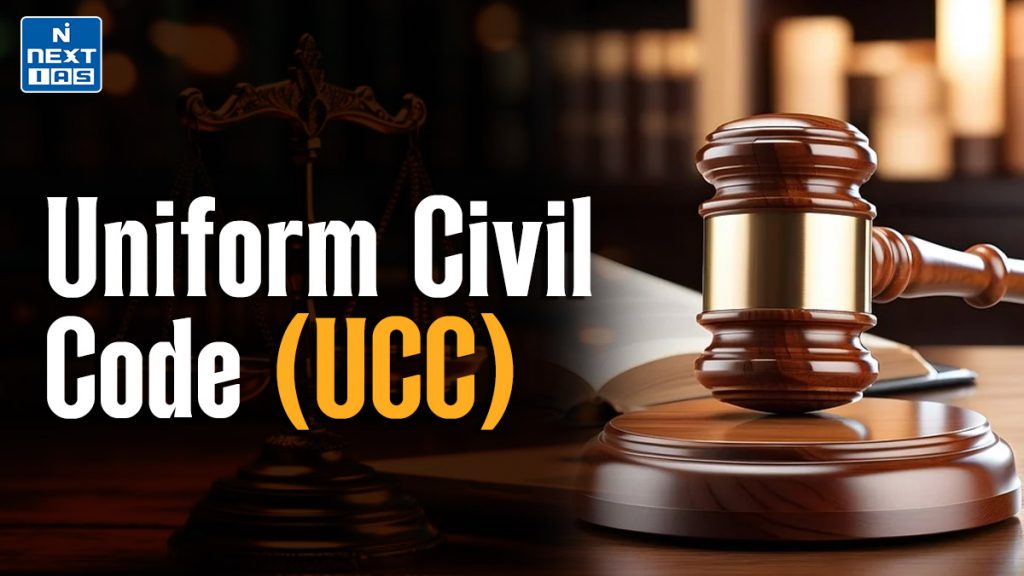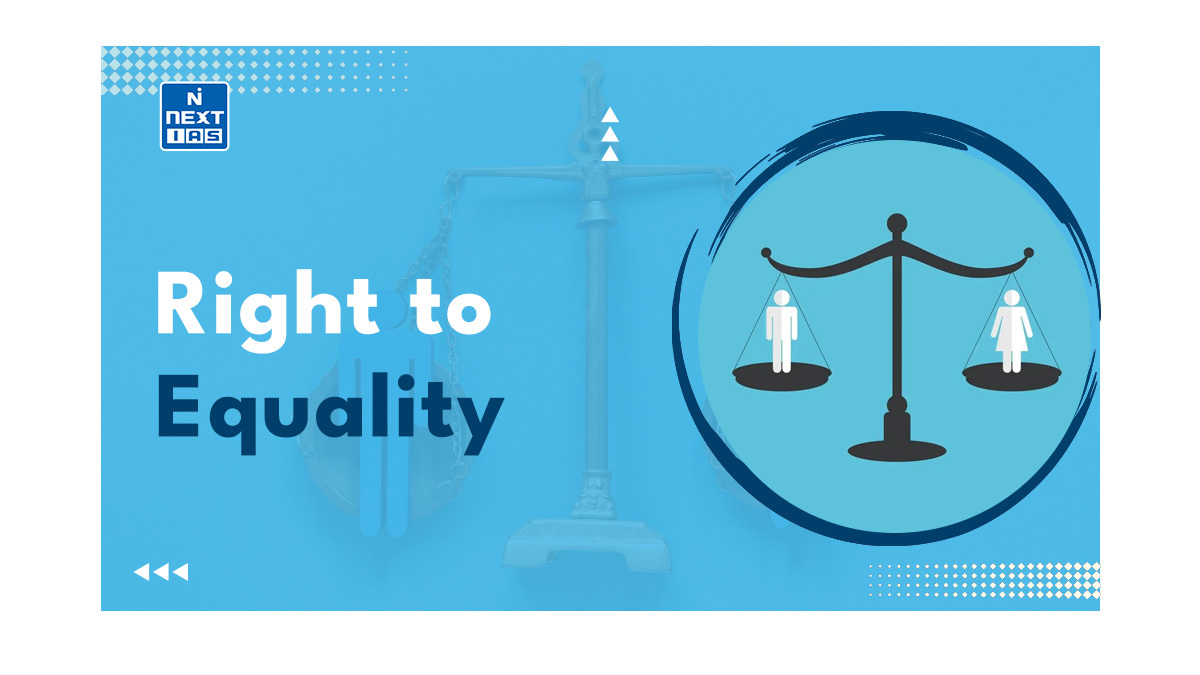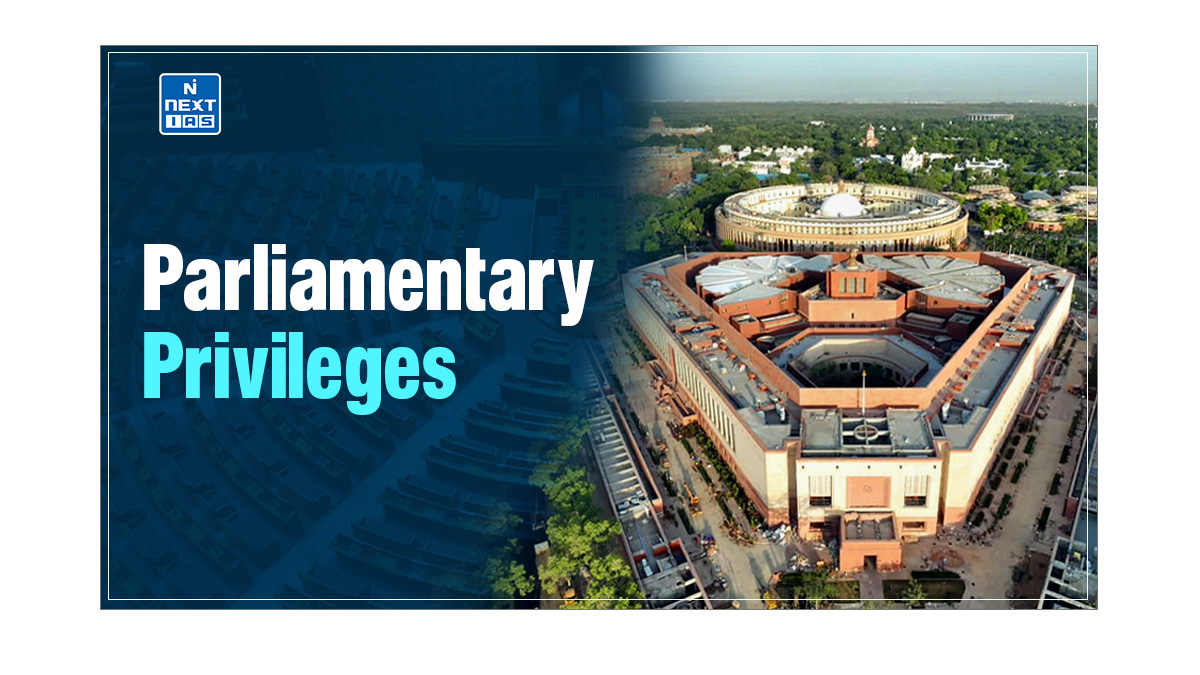
Rooted in the principles of equality, justice, and secularism, the Uniform Civil Code (UCC) has been a long-standing aspiration in India. Recent developments such as the passage of the Uniform Civil Code (UCC) Bill in Uttarakhand have reignited the debates surrounding it. This article of Next IAS aims to explain the meaning of the UCC, related constitutional provisions, its benefits and challenges, and the way forward.
Meaning of the Uniform Civil Code
A Uniform Civil Code (UCC) refers to a common law that applies to all religious communities in personal matters such as marriage, inheritance, divorce, adoption, etc. It aims to replace the different personal laws that currently govern personal matters within different religious communities.
A UCC primarily aims to promote social harmony, gender equality, and secularism by eliminating disparate legal systems based on different religions and communities. Such a code seeks to ensure uniformity of laws not only between the communities but also within a community.
Constitutional Provisions
The Directive Principle of State Policies mentioned in Article 44 of the Indian Constitution provides that The State shall endeavor to secure for the citizens a uniform civil code throughout the territory of India. However, being a Directive Principle, it is not justiciable.
Status of the Uniform Civil Code in India
- As of now, India does not have a Uniform Civil Code (UCC) implemented at the national level. Instead, different personal laws based on religious customs and practices govern matters such as marriage, divorce, inheritance, and adoption for different religious communities.
- However, over the years, the central government as well as some states have made certain efforts towards the implementation of UCC. These efforts can be seen under the following two heads:
Steps taken by the Center
Special Marriage Act, 1954
It was enacted to provide a secular alternative in marriages. It lays down provisions for civil marriage for the people of India and all Indian nationals in foreign countries, irrespective of religion or faith followed by either party.
Hindu Code Bills
The Hindu Code Bills, passed by the Parliament during the 1950s, are seen as a step towards the UCC. The following 4 Acts enacted under it seek to codify and bring uniformity in personal laws within the Hindu community:
- The Hindu Marriage Act, 1955
- The Hindu Succession Act, 1956
- The Hindu Minority and Guardianship Act, 1956
- The Hindu Adoption and Maintenance Act, 1956
Note: The term ‘Hindu’ also includes Sikhs, Jains, and Buddhists for the purpose of these laws.
Steps taken by the States
Goa
- Goa is the first state in India to have a Uniform Civil Code. After India annexed the territory in 1961, the Parliament enacted a law for continued application of the Portuguese Civil Code of 1867.
- This law in Goa is known as the Goa Civil Code or Goa Family Code and applies to all Goans, irrespective of their religious or ethnic community.
Uttarakhand
- Recently, Uttarakhand has passed the Uttarakhand Uniform Civil Code Bill 2024, becoming the first state in India to implement a Uniform Civil Code (UCC).
- The Bill provides for a common law for matters such as marriage, divorce, inheritance of property, etc., and applies to all residents of Uttarakhand except Scheduled Tribes.
Present Status
- Nationwide implementation of a Uniform Civil Code remains an elusive goal.
- As of now, most of the aspects related to marriage and divorces of persons belonging to different religions continue to be governed by their respective personal laws such as:
- Hindu Marriage Act (1955)
- Muslim Personal Law (Shariat) Application Act (1937)
- Christian Marriage Act (1872)
- Parsee Marriage and Divorce Act (1937) etc
Debates in the Constituent Assembly
The issue of the Uniform Civil Code (UCC) was debated extensively in the Constituent Assembly. Key arguments presented during the debate can be summarized as follows:
Arguments in Favor
The proponents of the UCC in the Constituent Assembly included members like B.R. Ambedkar, Alladi Krishnaswamy Ayyar, and K.M. Munshi. They put forth the following arguments in favor of a common civil code
- Equality and Justice: As per them, a common civil code would uphold the principles of equality and justice by ensuring uniform laws for all citizens, regardless of their religious affiliations.
- Secularism: A UCC would align with the secular nature of the Indian state, separating personal laws from religious considerations and promoting a unified national identity.
- Women’s Rights: Such a code would do away with discriminatory practices prevalent in personal laws, particularly those affecting women’s rights in matters such as marriage, divorce, and inheritance. Thus, it would promote gender equality and women empowerment.
Arguments Against
Opponents of the UCC in the Constituent Assembly included members such as Nazirrudin Ahmad and Mohammad Ismail Khan. They expressed the following reservations about the UCC:
- Religious Autonomy: It might cause potential infringement upon the religious autonomy of various communities as it would interfere with religious customs and traditions without the consent of those communities.
- Cultural Sensitivities: A single code might not adequately accommodate the unique customs and sensitivities of different communities. This, in turn, might hamper the diversity of religious and cultural practices in India.
- Social Unrest: Practices related to personal matters are deeply rooted in the religious and cultural identities of various communities in India. Implementing a uniform civil code might mean forcing them to relinquish their identities and could lead to social unrest and communal tensions.
Since a consensus on a UCC could not be reached in the Constituent Assembly, it was placed under the Directive Principles of State Policy under Article 44.
Supreme Court’s Views on Uniform Civil Code
The issue of a Uniform Civil Code has been dealt with by the Supreme Court in various cases. Accordingly, the Supreme Court has passed several landmark judgments and observations that have significantly contributed to the discourse on the UCC. Some of these include:
| Mohd. Ahmed Khan vs. Shah Bano Begum (1985) | In this case, the Supreme Court ruled that Muslim women were entitled to maintenance beyond the iddat period under Section 125 of the Criminal Procedure Code. It observed that a UCC would help in removing contradictions based on certain religious ideologies. |
| Sarla Mudgal vs. Union of India (1995) | In this case, the Supreme Court ruled that a Hindu husband, upon converting to Islam, cannot enter into a second marriage without dissolving his first marriage. The court emphasized the need for a UCC to ensure gender justice and equality. |
| Shayara Bano vs. Union of India (2017) | In this case, the Supreme Court declared triple talaq unconstitutional, holding that it violated the fundamental rights of Muslim women. The verdict underscored the urgency of enacting a UCC to address gender discrimination and ensure uniform laws governing marriage and divorce. |
| Joseph Shine vs. Union of India (2018) | In this case, the Supreme Court struck down Section 497 of IPC relating to adultery on the grounds that it violated Articles 14, 15 and 21 of the Constitution. The court emphasized the need for gender-neutral laws and suggested the enactment of a UCC to address inconsistencies in personal laws. |
| Indian Young Lawyers Association vs. State of Kerala (2018) | In this case, the Supreme Court addressed the ban on the entry of women of menstrual age into the Sabarimala temple in Kerala. The judgment highlighted the need for a UCC to harmonize conflicting rights and ensure gender equality across religions. |
Law Commission’s Views on Uniform Civil Code
The Law Commission of India has periodically examined the issue of the Uniform Civil Code (UCC) and its implications for Indian society. Some notable observations made by the Law Commission are as follows:
21st Law Commission of India (headed by Justice Balbir Singh Chauhan)
- This commission expressed the view that implementing a UCC might not be necessary or desirable at this time. Instead, it suggested a series of reforms within various personal laws pertaining to different communities.
- Thus, it recommended amendments and changes to existing family laws with the aim of ensuring justice and equality within all religions, rather than proposing a single uniform law.
22nd Law Commission of India (headed by Justice Rituraj Awasthi)
- This commission has issued a consultation paper on the UCC, seeking public feedback on the issue.
- Diverse sections of the population including religious organizations, legal experts, policymakers, and civil society groups have been asked to furnish their views regarding the feasibility, implications, and potential framework for a UCC.
Arguments in Favour of Uniform Civil Code
Based on the above-discussed discourse and the opinion of the experts, the following arguments can be put forth in favor of implementing a Uniform Civil Code:
- Simplifies Legal System: Having one set of laws for all will simplify the personal laws that are at present segregated on the basis of religious beliefs. This, in turn, would simplify the legal framework and the legal process.
- Promotes Equality: A UCC aims to ensure that all citizens of India, irrespective of their religion, are treated equally under the law. Thus, it will help promote the ideal of equality as envisaged in the Preamble.
- Promotes Secularism: A UCC would help towards achieving a secular state where the law is the same for all, regardless of religion. Thus, it would help promote the ideal of Secularism in the country.
- Promotes Gender Equality and Women Empowerment: The current personal laws of different religious communities put women in a disadvantageous position in matters related to marriage, divorce, inheritance, and property rights. Implementing a UCC would ensure equal treatment and opportunities for women in these areas, thus promoting the cause of Gender Equality and Women Empowerment.
- Promotes National Integration: A common set of laws for all citizens will promote a sense of oneness and the national spirit. This, in turn, will promote national unity and integrity and help India emerge as a nation in the true sense.
- Promotes Modernization: By doing away with outdated religious laws, a UCC would reflect the progressive aspirations of a modern democratic society based on current values and ethics.
- Elevates Global Image: Adopting a UCC would enhance India’s international image as a progressive and inclusive democracy committed to upholding the principles of equality, justice, and secularism. It would align India’s legal framework with global human rights standards and modern democratic practices.
Arguments Against Uniform Civil Code
Several critics have put forth the following arguments against implementing a Uniform Civil Code:
- Lack of Consensus: There is no consensus among various communities about what the UCC should entail. The lack of agreement on the principles and provisions of a common code makes it difficult to envision a UCC that is acceptable to all.
- Implementational Challenges: The sheer diversity of laws governing different communities makes the drafting and implementation of a UCC a daunting task. Creating a code that adequately addresses and respects the nuances of each community’s laws won’t be easy.
- Threat to Religious Freedom: Implementing a UCC would infringe upon the religious freedom of citizens by imposing uniform laws that may contradict their religious beliefs and practices. This might mean state interference in religious affairs.
- Threat to Cultural Diversity: Imposing uniform laws across such diverse communities would ignore the unique cultural practices, traditions, customs, and sensitivities of different religious groups. Overall, it might go against the idea of diversity.
- Fear of Majoritarianism: There is a concern that a UCC could reflect the beliefs and practices of the majority religion. Thus, it may be akin to imposing a majoritarian view on minorities and hence marginalization of minority groups.
- Threat of Social Unrest: Given the sensitivity around religious and cultural practices, there is a risk that attempting to implement a UCC could lead to social unrest and deepen communal divides.
- Undermining Federalism: Personal matters being under the Concurrent List, both the Parliament and state legislature are empowered to make laws on them. Imposing a UCC could undermine the federal structure by encroaching upon the rights of states to legislate on such matters.
Way Forward
- Dialogue and Consultation: There needs to be extensive dialogue and consultation with all stakeholders, including religious communities, legal experts, policymakers, and civil society organizations, to understand concerns and perspectives regarding the UCC.
- Public Awareness and Education: Conducting awareness campaigns and educational programs to inform the public about the benefits and implications of the UCC can help build consensus and garner support for its implementation.
- Piecemeal Approach: A piecemeal approach of codifying the different personal laws and putting them for public debates and scrutiny can be adopted. This will arouse public consciousness towards UCC.
- Inclusivity: A UCC should be drafted in such a manner that respects religious diversity while promoting gender equality and justice is crucial.
- Gradual Implementation: Implementing the UCC in a phased manner, starting with areas where there is least resistance and gradually expanding its scope, can help mitigate concerns and ensure a smoother transition.
- Monitoring and Evaluation: As and when a UCC is implemented, a mechanism should be established for monitoring its implementation, and evaluating its impact on society. This will help make necessary adjustments and improvements and smoothen the process of its implementation.
- Political Will: Political leaders must demonstrate leadership and a strong will to navigate through the complexities and challenges associated with the UCC implementation.
In conclusion, the Uniform Civil Code (UCC) stands as a critical imperative for India’s journey towards social justice, equality, and secularism. Despite some drawbacks and implementational challenges, UCC offers immense potential benefits. From ensuring gender equality and social cohesion to simplifying legal procedures and fostering modernization, the UCC holds the promise of protecting the oppressed as well as promoting national unity and solidarity.
Read out our detailed article on the Uttarakhand UCC Bill
Frequently Asked Questions (FAQs)
What is the Uniform Civil Code?
UCC refers to a common law being applicable to all religious communities in personal matters such as marriage, inheritance, etc. It aims to replace the different personal laws that currently govern personal matters within different religious communities.
What is the Need for a Uniform Civil Code in India?
The need for a Uniform Civil Code (UCC) in India arises from the imperative of establishing equality, secularism, and national integration in India.






